The debate over homeschool vs. public school is one that has been going on for years.
There are pros and cons to both options, and ultimately it is up to the parents to decide what is best for their child.
However, there are some general guidelines that can be followed in order to make the decision.
What Is Homeschooling?
Homeschooling is an educational option that allows parents to teach their children at home instead of sending them to school.
Homeschooling can be a great way to tailor the educational experience to your child’s individual needs and interests, and it can also provide a more relaxed and intimate learning environment.
There are a few different homeschooling models, but the most common is the parent-led model, in which parents take on the primary role of teacher.
This type of homeschooling requires parents to have a good understanding of their child’s learning style and to design lesson plans accordingly.
Other homeschooling models include distance learning, which employs online or correspondence courses, and unschooling, which follows a child-led approach and emphasizes hands-on learning experiences.
Whatever model you choose, homeschooling can be a rewarding experience for both you and your child.
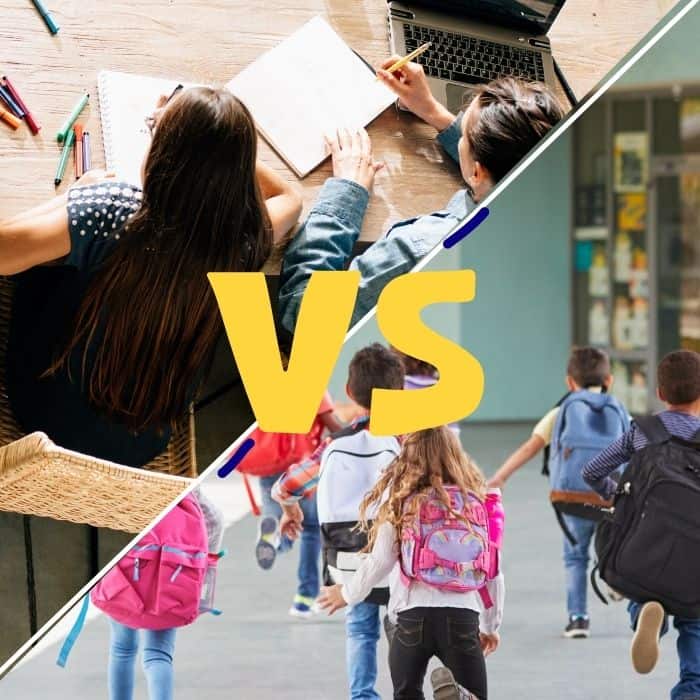
- What Is Homeschooling?
- Homeschool vs. Public School: Your Best Choice
- Homeschool Pros and Cons
- Homeschooling Pros
- Homeschooling Cons
- Public School Pros and Cons
- Public School Pros
- Public School Cons
- Reasons Parents Choose To Homeschool
- Is Homeschooling Hard?
- What Is The Success Rate of Homeschooling?
- Famous People Who Were Homeschooled
Homeschool vs. Public School: Your Best Choice
If you’re considering homeschooling your kids and pulling them out of public school, you need to watch this video.
In this video I break down the pros and cons of homeschooling vs. public schooling.
I want you to know that this is coming from someone who graduated from the public school system.
Even my oldest daughter experienced the public school system for a little over two years before COVID.
This video explains in detail our experience in both worlds, the pros and cons of homeschool vs. public school, and which educational model we are using in the future.
I hope this article and my YouTube video helps you make an informed decision that’s best for your child and your family.
Homeschool Pros and Cons
Over the last couple of years, homeschooling has become more and more popular for parents.
There’s been a transformative experience happening with the public school system, whether it’s teachers, curriculum, education, or choices.
And then COVID came and created a paradigm shift with parents as they became more involved in their child’s education.
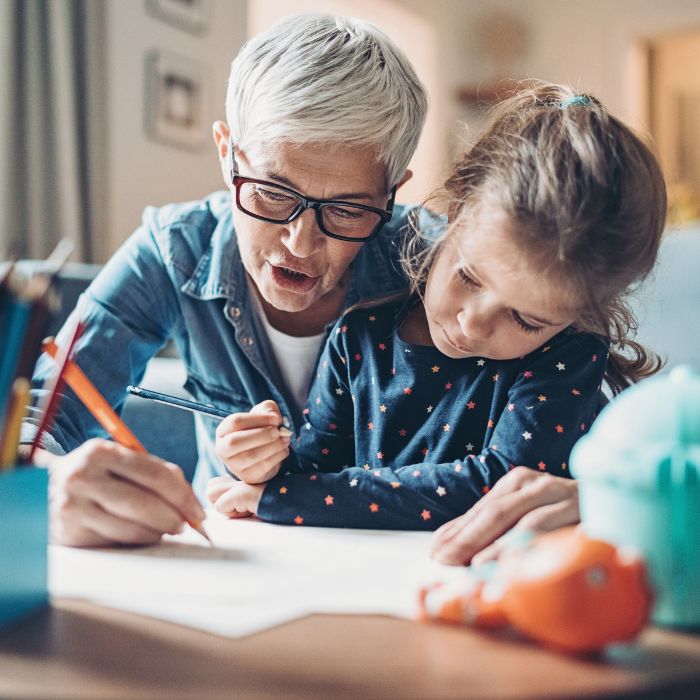
Homeschooling Pros
There’s More Control Of What Your Child Learns
One of the pros is you have more control of what your child learns and how they learn.
You can target their education towards their future goals and be in charge of how early they learn using technology (I love how the bark app keeps kids safe online.
Here’s my brutally honest review of the bark app and what my family’s experience has been so far).
You’re not bound by the one size fits all curriculum of the public schools.
You can make sure that your child is getting a more well-rounded education by supplementing with different materials, online resources, and educational experiences outside of the home.
Something that my family and I do is we don’t teach by grades.
Rather we teach by levels.
So, my son who went to the dentist the other day was asked “What grade are you in?”
And blessed my son’s heart, he said, “Oh fourth, fifth, and sixth.”
And the reason we don’t teach by grade, like the traditional public school does is to give them room to expand their learning according to their current aptitude.
Teaches Children Responsibility and Accountability
Homeschooling also teaches children responsibility and accountability because they are responsible for their own learning and completing their day’s assignments in a timely manner.
They’re not just sitting in a classroom being talked at all day.
They’re engaging in their education, and they’re accountable for their own progress.
This is something that I think is so important for kids to learn, especially as they get older and prepare to enter the workforce.
What this looks like in our family is after morning prayers, breakfast, and scripture study the children start in their tasks for that day.
For my preschoolers who are learning their ABCs they get to enjoy a lot of playtime since this is primarily how young children learn.
My older children are each given a folder with their day’s assignments and paperwork.
They complete this work and their reading during the morning hours.
They do their pages for their writing, their math, social studies science.
Then we usually take a lunch break for an hour and then the afternoon is spent on interest-based learning, such as coding, artwork, or another topic they’re interested in learning.

More Options For Extracurricular Activities
There are also more options for extracurricular activities because you’re not bound by the school schedule.
Your child can take classes, participate in popular sports, and participate in other activities outside of the home that may better suit their interests and needs.
You also have the option to create your own curriculum or even do an online school program like we did with our kids for a couple of years.
This is something that I think is amazing because it allowed us to travel and take our education with us wherever we went.
Freedom to Choose Your Child’s Curriculum
You have the freedom to choose your child’s curriculum.
There are so many amazing resources available for homeschoolers these days.
You’re not bound by the traditional textbook methods of teaching.
You can use online resources, video lessons, workbooks, and even create your own materials if you want to.
(FYI if you’re just starting to homeschool your child, all my littles LOVED the Smart Little Learner’s Preschool Curriculum).
My family has used a variety of different resources over the years, and it’s been so beneficial for our kids, including as we help them learn more about their faith in God during their religious studies.
Flexibility in Scheduling
Homeschooling also allows for more flexibility in scheduling.
This is something that was really important to us when we started homeschooling because of mine and my husband’s work schedule.
It allowed us to be more flexible with our time and not have to worry about being at a certain place at a certain time, while also maintaining the level of our children’s academic performance and the time they spend learning.
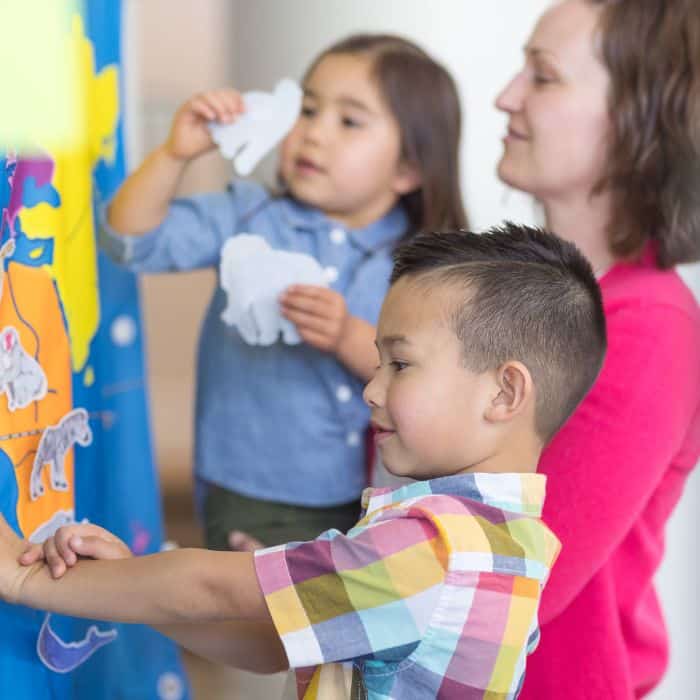
Homeschooling Cons
What About Socialization?
Now, I know one of the first things people are going to ask about is socialization.
And that’s a valid concern.
But I’m here to tell you that it doesn’t have to be an issue.
And once you start homeschooling your child, one of the biggest drawbacks you’ll hear about homeschooling is “what about socialization”?
My friend, can I tell you that my children have never socialized more in their entire life ever since homeschooling them?
They talk to everybody.
I’m pretty sure they talk to the people in our community that don’t want be spoken to.
But you know, those sweet people, they smile at my sweet children and they’ll nod their heads, they’ll say a few words and then they go on with their day.
There are so many missed socialization opportunities for public school children that homeschooling children enjoy.
What Are The Negatives of Homeschooling?
And I think one of the paradigm shifts that have to happen is people that haven’t had the opportunity to homeschool or to be around a homeschooling family.
They think homeschooling families stay inside all day, huddled up with the curtains closed hiding in the dark under a blanket.
And that is not the case.
Whether it’s warm or cold outside my kids spend so much time outside exploring the world around them.
They’re hiking, climbing, going to museums, visiting exhibits, and they are outside socializing.
So I feel bad putting socialization as a con, but I wanted to put it here to open up that discussion to say that it is still perceived as a drawback, but yet it is one of the most rewarding experiences from homeschooling.
But in that regard, depending on the state that you live in and the community that you’re in, sometimes finding those socialization opportunities are difficult for children.
RELATED: Here are the best resources to explain the four stages of the butterfly life cycle for kids. You’ll find videos, books, printables, and more!
You might be in a small community. You might be in a community that has really strict homeschooling laws.
So, I can understand why having your child socialize would prove to be difficult or be a bit more challenging to find those groups.
But I do hope you’re using social media sites and other public events and locations in your region, or at least a neighboring city that is somewhat larger, so you can set up those interactions and appointments for your kids.
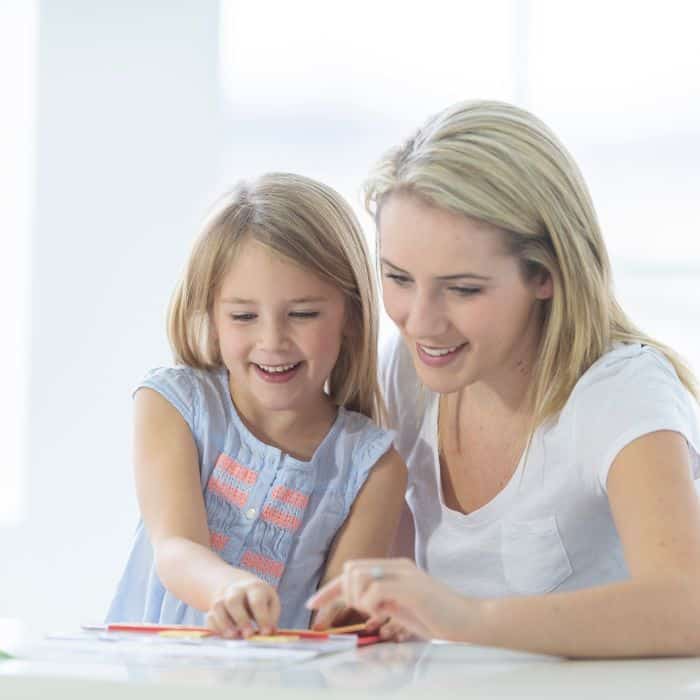
Pressure To Fit In With The Public School Schedule
Another drawback of homeschooling is that you can feel pressure to fit in with the public school schedule.
This was something that we experienced when we first started homeschooling and I still see other families experience it as well.
It’s easy to want to start your day at 8:00 AM, do a few hours of academics, take a lunch break, and then finish up around 2:30 or 3:00 PM like the public schools do.
And let’s not forget the September to June academic school year timeframe as well.
But here’s the thing, you’re not a public school.
You don’t have to adhere to their schedule.
One of the beautiful things about homeschooling is that you get to set your own homeschool schedule.
And so if you find that your kids are struggling in the morning or they’re not retaining information as well, then you can switch up your schedule and start later in the day.
You could do academics in the morning and then take a break in the afternoon for lunch and some outdoor time.
And then pick back up again later on in the day or even at night.
It doesn’t matter when you do it, as long as you get it done and as long as your children are learning.
But there is that pressure to try to fit into that public school model and I understand why it happens, but don’t let it happen to you.
Set your own schedule.
Do what works for you and your family.
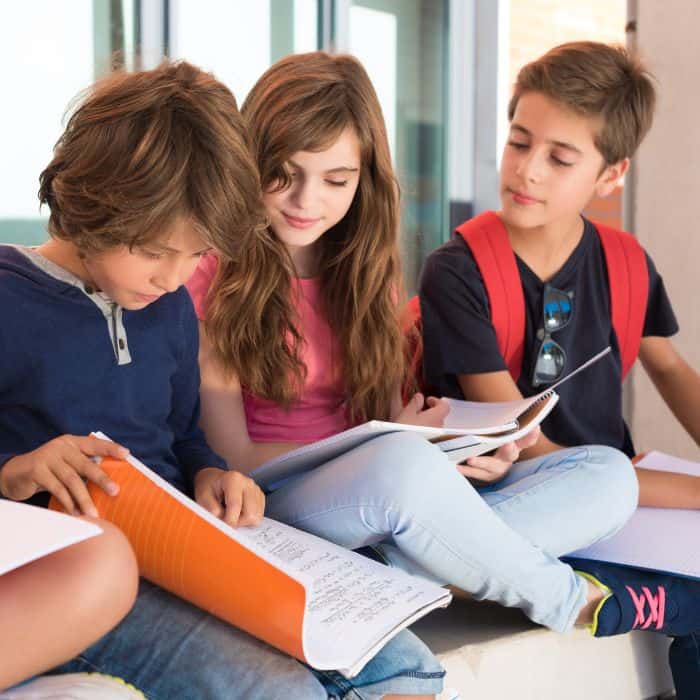
Public School Pros and Cons
Now let’s talk about the public school.
There are some really great things about public schools.
And I’m going to list a few of those here.
But I also want to caution you that there are definitely more cons to public schooling than there are pros.
So, if you’re on the fence and trying to decide whether or not homeschooling is right for your family, I would highly encourage you to sit down and make your own list.
Make a list of the pros and cons of each schooling method and see which one stacks up higher for your family.
Let’s start with the Pros of public schooling:
Public School Pros
Public School Tends To Be Cheap or Free
Depending on the state that you live in, homeschooling can get pretty expensive (it doesn’t have to be though).
You might have to pay for curriculum.
You might have to pay for testing fees and membership dues for your local homeschooling groups.
So, one thing that public schooling has going for it is that it’s free of charge.
Children Are In A Classroom With Other Students
One of the benefits about public school is that schooled children are in a classroom with others, their age, and each child comes from all walks of life.
Every one of them has a story.
Every one of them has different life experiences.
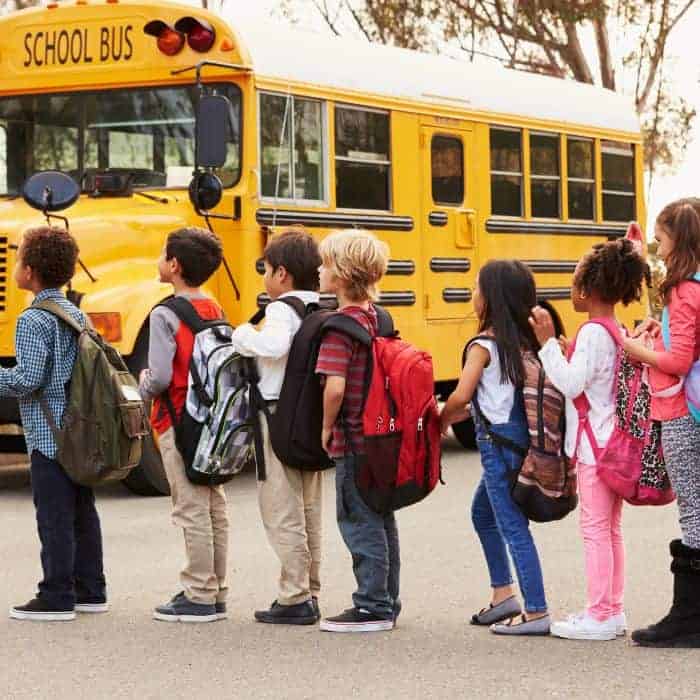
Rhymical And Dependable Daily Schedule
Another benefit to children being in a public school is that you have that rhythmic and daily dependable schedule where you know what you and your child are doing and the exact time.
For example, you know from 8:30 a.m. to 3:15 p.m., your child is in a certain location with a specific public school teacher.
They have lunch at 11:30 a.m. and they’re having recess at certain times of the day.
This type of schedule is more for a parental peace of mind knowing where your child should be at at every moment of every day.
There are Options For Special Needs Students
If you have a child that has special needs, there are definitely options for your child in the public school system.
You can request an IEP, or an Individualized Education Program, meeting with the special education teachers and staff to ensure that your child’s needs are being met in the public school system.
Now, I’m not going to lie to you and say that all of these requests will be honored by the public school.
But if you advocate for your child and you stay on top of their education and ensure that their needs are being met, then you’ll find that your child is most likely to have a very pleasant experience in the public school system.
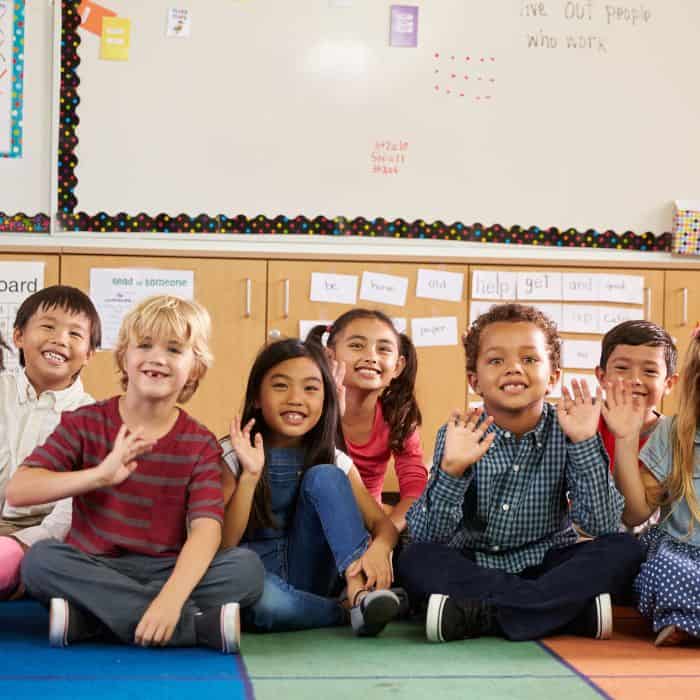
Public School Cons
Now let’s talk about some of the drawbacks of the public school system.
The Level of Education Isn’t What Your Child Needs
There are so many learning styles for children and not all of them are met through the public education system.
Perhaps your child is performing at a higher level, or maybe your child has a different learning capacity than just the structural classroom setting.
For example, if your child is more of a kinesthetic learner, they learn by doing and moving their bodies, the public school system isn’t going to meet all of those needs because they’re going to be sitting in desks for long periods of time.
Or if your child is more of an auditory learner, they need to be able to hear the information and talk it out, the public school system might not meet all of their needs either.
My two oldest children are textbook learners.
They can sit down, read, learn, and explore this way.
So when I started homeschooling my third child I quickly found out that he was a visual learner.
In order for him to successfully learn a concept or a skill he had to see it.
He had to watch me do it or see it done on a video or some other type of presentation.
And because I understand how he learns best, I was able to find materials and curriculum that helped him learn in the way that he learns best.
The public school system unfortunately just can’t cater to all of those different types of learners.
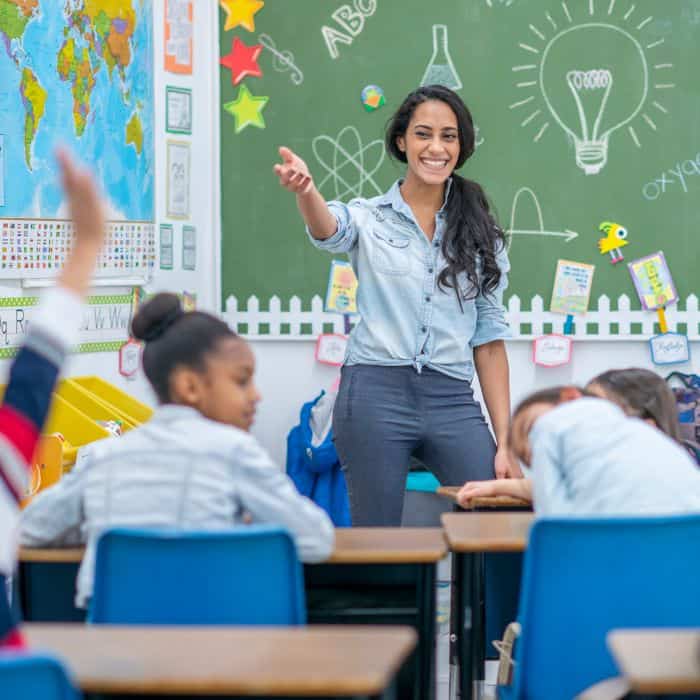
Your Child Might Not Get The Individual Attention They Need
In a public school setting, there are just too many children for one teacher to give the individual attention that some children need in order to excel.
There are also some children who have different behavioral issues or perhaps they need more structure than what the public school can provide.
That’s not to say that there are not wonderful teachers out there who try their best to give every child the attention they need, but it’s just impossible for one teacher to do that with 20, 30, or 40 children in a classroom.
It’s Not Always A Safe Environment
Now, I know this is a touchy subject, but unfortunately, public schools are not always a safe environment.
There have been too many school shootings, bullying’s, social peer pressure, and reports of violence in schools to ignore this fact.
I’m not saying that homeschooling is a 100% guarantee that your child will never experience any type of violence, but it is a lot easier to protect and monitor your child when they’re in a homeschooling environment.
There are also other dangers such as drugs, alcohol, and gangs that can be found in public schools.
Now I’m not saying that these things don’t exist in the homeschooling world, but again, it is a lot easier to keep track of your child and their activities and to monitor who they’re hanging out with when they’re being homeschooled.
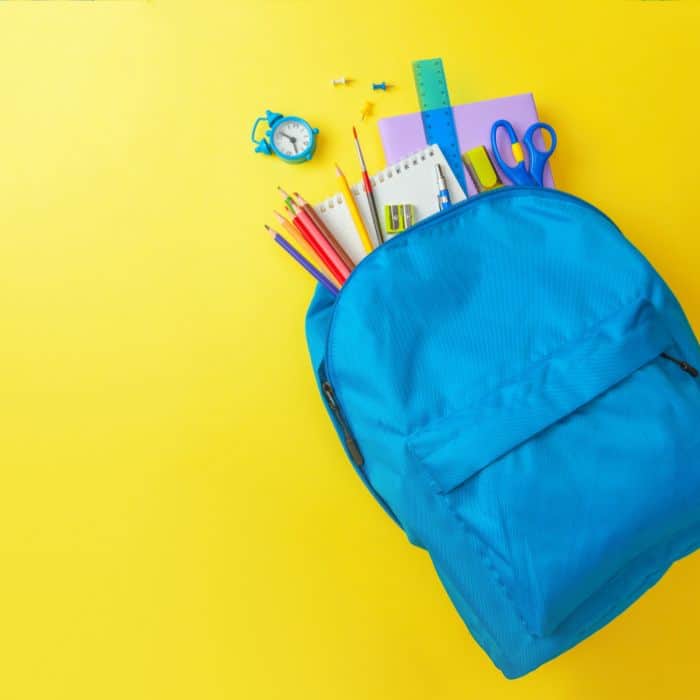
The Constant Overwhelm of Daily Public School Schedules
My oldest daughter went to public school for two years.
When she first started she was excited for the new adventure.
She came home after her first day of school and she was exhausted.
She kept falling asleep in the car, she fell asleep at the dinner table, and there emotional breakdowns the first week because of the daily schedule the public school system required for students.
Sometimes children aren’t ready for that high demand schedule.
They’re experiencing the same 40 hour work week schedule that adults are expected to perform.
The only difference is some children are at school earlier with morning activities, or stay later due to after school programs.
High Rising Costs of Private School
If you’re not happy with the public school system but you don’t want to homeschool, another option is to send your child to a private school.
Now, this might not be an option for everyone because of the high rising costs of tuition for some of these schools.
But if it’s something you’re considering, just do your research to make sure the school is accredited and that it’s a good fit for your child.
Charter Schools Might Not Be Available In Your Area
Charter schools are a great alternative to the public school system (if you’re not ready to homeschool your child).
However, they might not be available in your area.
And even if they are, the charter school might not have the curriculum or teaching style that you’re looking for.
So just do your research before you make any decisions.
Public schools can be a great option for some families, but for others, it might not be the best fit.
It’s important that you weigh the pros and cons of both options to decide what’s best for your family.
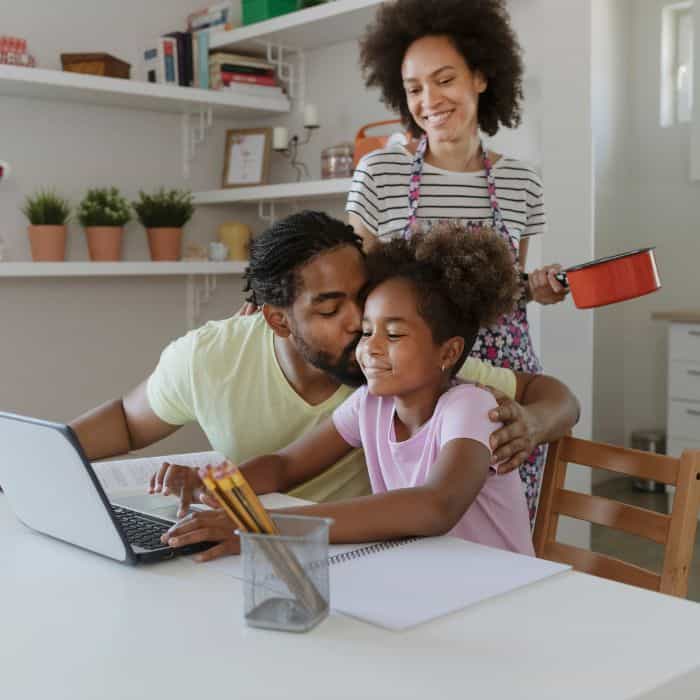
Reasons Parents Choose To Homeschool
When you homeschool your child you are laying, building, and strengthening the foundation for the rest of their lives.
You’re instilling in them a love of learning, a desire to explore the world around them, and giving them an education that is tailored specifically to their needs.
There are so many reasons to homeschool your child.
Because homeschooling is more than learning science, history, writing, and math (although you do learn those things).
You are teaching your child about how to thrive as a successful adult.
They will learn money management, grocery shopping, civic duty, how to run a small business, and so much more.
Homeschooling gives you the opportunity to spend quality one-on-one time with your child.
You get to know them in a way that you wouldn’t if they were in school all day.
The fastest thing you learn is their strengths, their weaknesses, their dreams, and their goals.
You are able to help them grow into the person they were meant to be.
Homeschooling gives you the opportunity to spend time with your other children as well.
If you have more than one child at home, you’re able to give them the attention they need and deserve without feeling guilty that you’re not giving enough attention to the others.
Is Homeschooling Hard?
Any parent who has ever considered homeschooling their child is likely to have wondered, “Is homeschooling hard?”
The simple answer is that, like anything else, homeschooling has its challenges.
But with a little preparation and planning, homeschooling can be a rewarding experience for both parents and children.
One of the biggest challenges of homeschooling is finding the time to fit schooling into your schedule.
If you work full-time or have other commitments, it can be difficult to find time for lesson planning and providing instruction.
However, there are many resources available to help busy parents make homeschooling work.
In addition, homeschooling requires a certain amount of discipline.
It can be easy to get sidetracked by laundry or other household chores when you’re trying to teach your child math or reading.
However, if you set aside dedicated time for schooling each day and stick to a regular schedule, you’ll find that homeschooling can be a very successful way to educate your child.
A strong word of advice though, don’t quit after your first year.
It does take time to get into a groove and find what works best for your family. Don’t give up though, because it will be worth it in the end!

What Is The Success Rate of Homeschooling?
The success rates of homeschooling students speak for themselves and they are significantly higher than the rates of public school students.
A home education research study by the Home School Legal Defense Association found that the average homeschooler outperformed their public school counterparts by 30-37 percentile points across all subjects.
In addition, 83% of homeschoolers graduated from college compared to only 50% of students who attended public schools.
And if your homeschooler is getting ready to attend college for the first time, then they’ll need to know what to wear to a college formal.
Homeschool students typically score up to 30 percentile points above public school students on standardized academic achievement tests.
Another study by the Education Research Institute shows that homeschool students have higher levels of civic and community involvement than their public school peers.
So, if you’re wondering if homeschooling is right for you and your child it’s important to note that homeschool students perform highest regardless of their parent’s level of formal education or household income.
You can read more about the success rates of homeschool students on the National Home Education page.
Famous People Who Were Homeschooled
As more and more families choose to homeschool their children, it’s not surprising that a number of famous people have also been homeschooled.
- Thomas Edison
- Tim Tebow
- Taylor Swift
- Serena Williams
- Agatha Christie
- Ryan Gosling
- Theodore Roosevelt
- Alexander Graham Bell
- Justin Bieber
- Louisa May Alcott
- Abraham Lincoln
- Simone Biles
- Florence Nightingale
By freeing them from the restrictions of traditional schooling, homeschooling allowed these famous individuals to develop into the creative and innovative thinkers that they are remembered as today.
Homeschooling can do the same for your child and provide them with a unique educational experience that can lead to success in any field.
Homeschooling is a great way to provide your child with a unique and individualized education.
While it does have its challenges, homeschooling can be a very rewarding experience for both parents and children.
With a little preparation and planning, homeschooling can be a successful way to educate your child.
If you’re considering homeschooling, don’t forget to check out all of the resources available to help you get started.
You can visit our shop to see all the resources and printables we have available to help your child learn.

Micah Klug is a wife, homeschooling mother to five children, and author. She teaches time-tested solutions to help parents remember what matters most in life, including strengthening their home, faith, and family relationships. To learn how a child who grew up in an authoritarian home is now creating an environment of peace and joy in her own home visit this page. If you want to contact Micah, send her an email here or email [email protected].
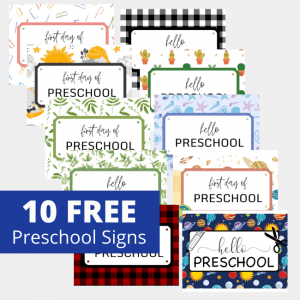


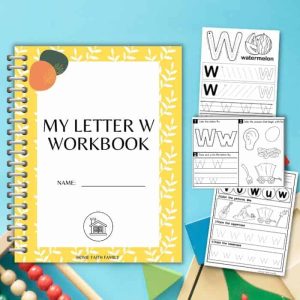
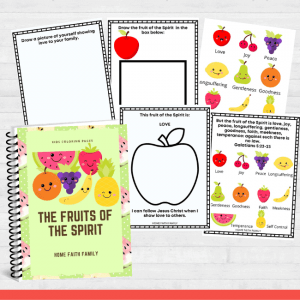

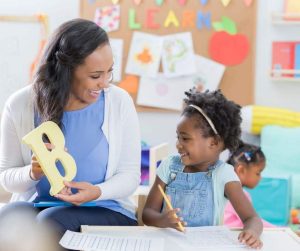

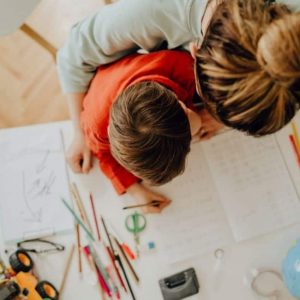
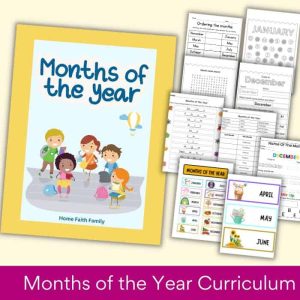
‘They’re engaging in their education, and they’re accountable for their own progress’ Exactly! Students don’t have to commute back and forth between home and school wasting 1-2 hours daily. Instead, they can use this time in a more productive way. At home, they have a high power of concentration and learn to manage their time in a better way.
Yes! And as children get older it’s important for them to shoulder some of the responsibility in their learning to help prepare them for life’s future events and learning adventures. Thanks, Noah!